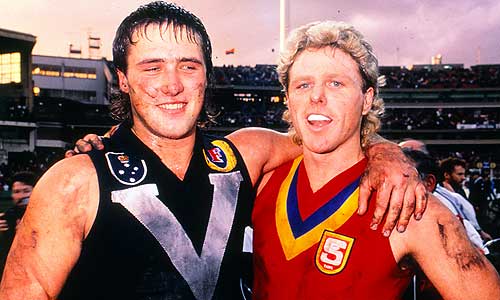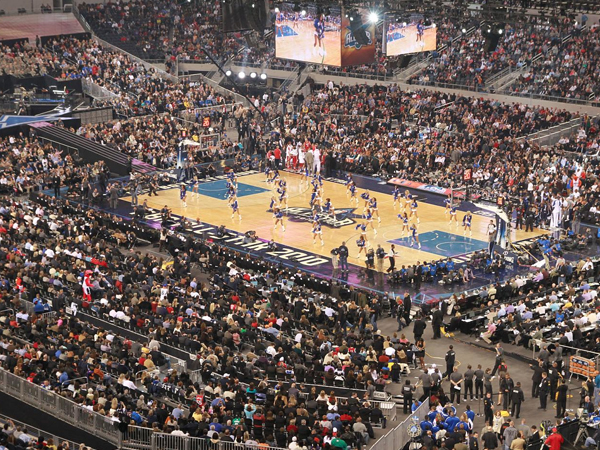The NBA promotes and celebrates its All-Star weekend. Used essentially as a break from the grind of the NBA season, it is also an opportunity for some of the world’s greatest athletes to exhibit their exceptional talents.
‘Razzle dazzle’ sport of the highest order: slam dunk contests, three point shootouts and an exhibition game consisting of the eastern and western divisions superstars are some of the noteworthy events across the action packed schedule.
The concept is widely popular and very suitable to the American sporting landscape, as well as the game of basketball in particular.
 After watching Lebron James and co. strut their stuff, a question that often emerges is whether the AFL could implement an All-Star component into its schedule. This inevitably sparks talk of re-instituting State of Origin football too.
After watching Lebron James and co. strut their stuff, a question that often emerges is whether the AFL could implement an All-Star component into its schedule. This inevitably sparks talk of re-instituting State of Origin football too.
But can we afford to put our players at risk in a game of brutal physicality? That’s the real question, and for years, that’s been the real deal-breaker.
There’s no doubt that the All-Star weekend has a worthwhile place on the NBA calendar. It’s exciting, entertaining and enables the vast majority of players to have a rest physically and mentally.
Fans love the weekend and crucially the players and organisations embrace it, permitting their elite players on multi-million dollar contracts to participate in potentially hazardous events that do not contribute to the success of an NBA franchise.
Having said this, the pleasant nature of the festivities means the likelihood of an injury is minimal and players make an effort to look after each other’s wellbeing.
Basketball is a contact sport, but you can control the level of contact without significantly detracting from the spectacle.
The score of the 2013 All-Star game was 143-138, with Los Angeles Clippers point guard Chris Paul winning MVP honours in leading the West to victory. There was certainly winning intent and application in an attacking sense, but as happens every year, defensive pressure was limited and the physicality was undeniably reduced from the standard set in a legitimate NBA game to ensure highlights galore.
An AFL match cannot be simulated in this way and remain interesting for the viewer. As supporters of the game, we love the big hits, miraculous goals, high flying marks and the courage to perform those actions.
Full commitment All-Star football would be riveting, yet it is unrealistic in the current climate where player welfare and the pursuit of premierships rein supreme – and rightfully so.
As it stands, we would essentially be left with an uninspiring game of touch football in order to preserve the finest talent in the competition.
But don’t forget, the All-Star game is just one facet of the entire carnival. It would be great to see the skills of league’s best tested and admired. Perhaps at mid-season, we could hold the ultimate skills challenge, including the following aspects:
- Torpedo: players have three attempts at unloading their most prodigious barrel.
- Snapshot: players have obstacles and varying distances and angles to shoot for goal.
- Drop punt: players have targets to hit from varying distances and angles.
- Handball: players must hit a target in different settings, such as in traffic, sprinting or without looking.
- Trick shot: players display their most innovative ways to kick a goal.
This concept would be suitable for a television network given its short time frame and variety in an environment with an ever-increasing demand for instant gratification.
Player safety would also be guaranteed.
State of Origin football was prominent throughout the 1980s and early 1990s. Players took great pride in representing their state and building their reputations against the best in the country. The passion of the late, great Ted Whitten for the ‘Big V’ in his role as chairman of selectors symbolised the overall feeling toward State of Origin during its halcyon days.
Nearly 92,000 people attended the 1989 battle between Victoria and South Australia, and it seemed such popularity would ensure its existence. Just one decade later, the professionalisation of football prompted a greater focus on managing workloads and thus State of Origin was sacrificed.
Promotion of its reinstitution regularly occurs in the public forum, with supporters, media personalities and even players pushing the idea. Collingwood star Scott Pendlebury wrote a piece in 2011 endorsing his and other players desire to play in some form of representative football.
‘Ask any of the guys and they would jump at the chance to play in a game that pits the top players in the league against each other,’ Pendlebury wrote for the Herald Sun.
He also recognised the biggest hurdle.
‘The misconception is that players don’t like it. Or don’t want it. To me, that’s incorrect. It’s the clubs and coaches that aren’t keen on it because of the risk of injury. We need to get over that.’
If only it were that simple.
In the 2012 All-Star game, Los Angeles Lakers champion Kobe Bryant copped a hard hit from the Miami Heat’s Dwayne Wade and subsequently broke his nose. Fortunately, he did not miss the Lakers next game, wearing facial protection to allow him to take his place.
But what if he did have to sit on the sidelines?
The Lakers would have been without their best player, results may have been altered and finals positions may have been influenced by his absence.
This is the exact reason why AFL coaches and club officials do not want All-Star or State of Origin games. The risk of serious injury is too great to allow marquee players the chance to put themselves in harmful positions.
As much as supporters would enjoy watching the best play the best, if someone like Lance Franklin tore his knee or fractured a cheekbone, there would be serious fallout and frustration.
In our fantasies, an All-Star or State of Origin game would be sensational. In reality, it will not happen in the near future.
Club success means too much to too many people to put players in jeopardy. We all know that, but our temptations can sometimes cloud our judgement. It is very tempting, but we’re not in a position to eat the forbidden fruit.
Paul Bastin is a final-year Bachelor of Media Studies student at La Trobe University and upstart’s incoming sports editor. You can follow him on Twitter: @PaulBastin10







